Difference between revisions of "GBZ Main Board"
m (→Alternatives: added some alternatives) |
m (→Not Tested - Advanced: added some more alternates) |
||
| Line 18: | Line 18: | ||
===Not Tested - Advanced=== | ===Not Tested - Advanced=== | ||
These systems are available and roughly the same size as a typical Raspberry Pi, and have been used or theorized to be usable by some of the more advanced modders. | These systems are available and roughly the same size as a typical Raspberry Pi, and have been used or theorized to be usable by some of the more advanced modders. | ||
| + | |||
| + | Keep in mind that all these micro "computers" use essentially cell phone or tablet CPUs, usually an ARM flavor of some kind just like the Raspberry Pi. Because of how ARM works, it needs a proprietary/secret/magical blob of code that never gets released to the public in order to work. If the manufacture decides to stop supporting it (just like what happens to cell phones) you'll never get newer versions of this blob to update/maintain the software. Keep that in mind when choosing a non-Raspberry board for a project, as the RPi Foundation has been very good so far with timely updates and supporting even the oldest version of their products. | ||
{| class="wikitable" | {| class="wikitable" | ||
| Line 46: | Line 48: | ||
|| [https://www.udoo.org/udoo-neo/ UDOO NEO] | || [https://www.udoo.org/udoo-neo/ UDOO NEO] | ||
* ARM Cortex-A9 | * ARM Cortex-A9 | ||
| − | * Claims to support Android | + | * Claims to support Android in addition to Linux. |
* Vaguely RPi2/3 form factor | * Vaguely RPi2/3 form factor | ||
* Has an LVDS port for driving raw screens | * Has an LVDS port for driving raw screens | ||
* Bunch of GPIO including SPI, I2C, etc | * Bunch of GPIO including SPI, I2C, etc | ||
| + | |} | ||
| + | |||
| + | {| class="wikitable" | ||
| + | |- | ||
| + | | [[File:ROCK64 board-300x300.jpg|250px|link=]] | ||
| + | || [https://www.pine64.org/?page_id=7147 Rock64] | ||
| + | * Basically a cheap tablet in RPi formfactor | ||
| + | * Physically the same size/shape as RPi3 | ||
| + | * A good bit more powerful than an RPi3 | ||
| + | * Standard 40-pin GPIO layout, + more on a 2nd header | ||
| + | * USB 3.0 & GigE might be useful in non-portable builds | ||
| + | * Has EMMC support which is much faster than SD | ||
| + | * Claims to support 4k | ||
| + | * Android (7.1) & Linux support | ||
| + | |} | ||
| + | |||
| + | {| class="wikitable" | ||
| + | |- | ||
| + | | [[File:Asustinker1.jpg|250px|link=]] | ||
| + | || [https://www.asus.com/us/Single-Board-Computer/Tinker-Board/ Asus Tinker Board] | ||
| + | * Basically the same thing as the Rock64 | ||
| + | * RPi standard layout, with the expected gpio options | ||
| + | * h.264 & h.265 decoders, might be a good media player | ||
| + | * Slightly faster CPU than the Rock64 | ||
| + | * Makes no claims about 4k support, but should be doable considering the close specs with the Rock64 | ||
| + | * Android(6.0) & Linux support | ||
| + | * GigE, but only USB 2.0 | ||
| + | |} | ||
| + | |||
| + | {| class="wikitable" | ||
| + | |- | ||
| + | | [[File:Le Potato.jpg|250px|link=]] | ||
| + | || [https://libre.computer/products/boards/aml-s905x-cc/ The Potato (AML-S905X-CC)] No, seriously, that's what they called it. | ||
| + | * Pretty much a straight RPI clone with different CPU | ||
| + | * Cortex-A53 | ||
| + | * 2gb ram | ||
| + | * 40 GPIO | ||
| + | * 4x USB 2.0 | ||
| + | * 100mb ethernet | ||
| + | * Claims to support Android 6, 7, & 8, but only has image files for 7 on their site | ||
| + | * EMMC support | ||
|} | |} | ||
Latest revision as of 21:13, 2 December 2017
Original
A Raspberry Pi Zero is the recommended starting point.
Alternatives
Tested
A Raspberry Pi 2 or 3 are usable, but will require manually removing the USB ports, ethernet ports, GPIO headers, and possibly ripping the PCB down in size.
The new Raspberry Pi Zero W will also work, making WiFi and Bluetooth dongles non-necessary.
Not Tested - Advanced
These systems are available and roughly the same size as a typical Raspberry Pi, and have been used or theorized to be usable by some of the more advanced modders.
Keep in mind that all these micro "computers" use essentially cell phone or tablet CPUs, usually an ARM flavor of some kind just like the Raspberry Pi. Because of how ARM works, it needs a proprietary/secret/magical blob of code that never gets released to the public in order to work. If the manufacture decides to stop supporting it (just like what happens to cell phones) you'll never get newer versions of this blob to update/maintain the software. Keep that in mind when choosing a non-Raspberry board for a project, as the RPi Foundation has been very good so far with timely updates and supporting even the oldest version of their products.
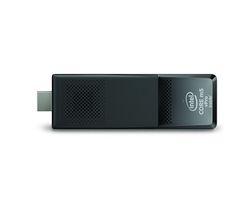
|
Intel Core M vPro STK2MV64CC stick
|
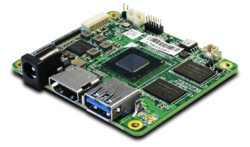
|
UPCore
|
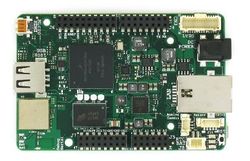
|
UDOO NEO
|
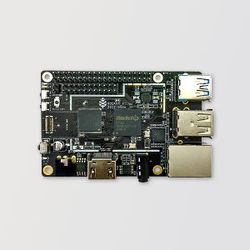
|
Rock64
|
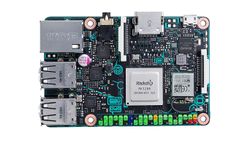
|
Asus Tinker Board
|
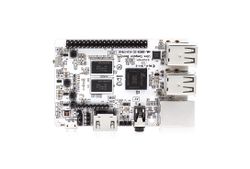
|
The Potato (AML-S905X-CC) No, seriously, that's what they called it.
|